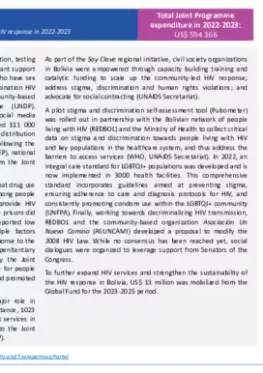|
Bolivia
In 2022-2023, Bolivia continued to scale up HIV prevention, testing and treatment services for key populations with significant support from the Joint Programme. For instance, 13 592 men who have sex with men and 1746 transgender women accessed combination HIV prevention packages in 2023 through community-based programmes supported by the Joint Programme (UNDP). Additionally, the Tripple X (Xpresa, eXplora, eXige) social media campaign aimed at increasing condoms usage reached 111 000 young people and resulted in a 12% increase in condom distribution within the public health system in a year (UNFPA). Following the Government’s adoption of pre-exposure prophylaxis (PrEP), national guidelines for PrEP were developed with support from the Joint Programme (WHO).
A situation analysis of HIV services in prisons revealed that drug use was one of the main risk factors for HIV transmission among people in prisons. It also showed that although all prisons provide HIV treatment services to people living with HIV, some of the prisons did not offer rapid HIV tests. Additionally, the majority reported low adherence to antiretroviral treatment due to multiple factors including social, economic and individual factors. In response to the low number and capacity of health professionals in penitentiary facilities, capacity building initiatives implemented by the Joint Programme further strengthened HIV services and care for people living with HIV in prisons, including those using drugs, and promoted their human rights (UNODC).





